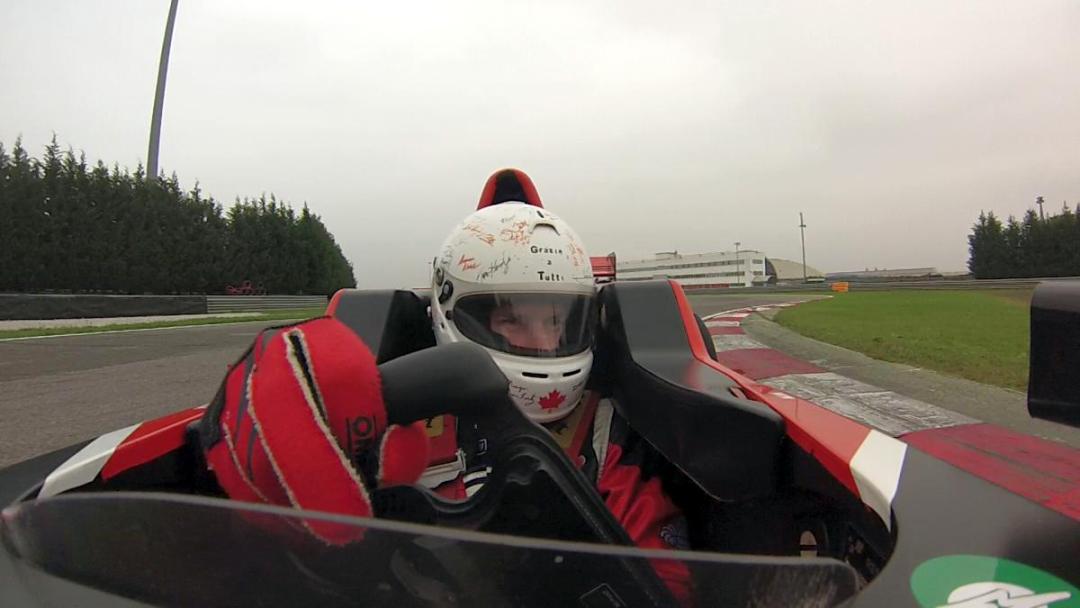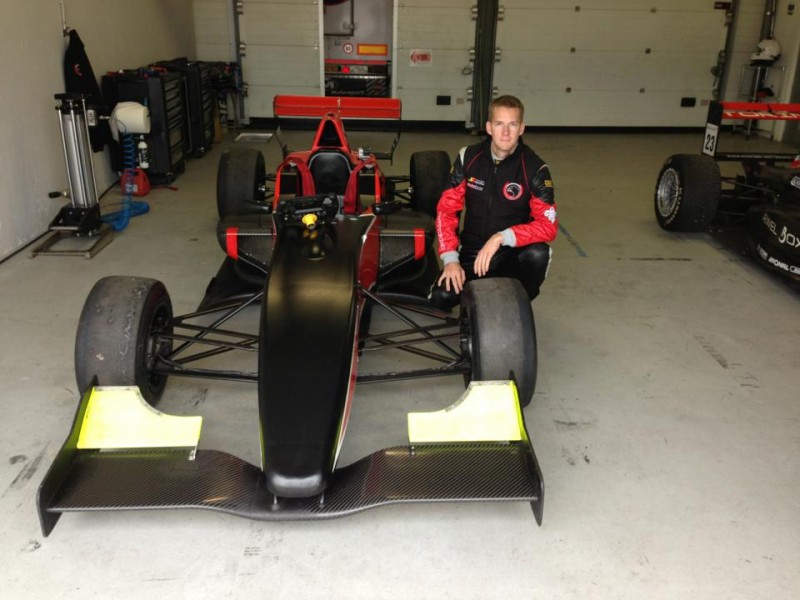
David Richert at at Adria International Raceway in Italy
In the driver’s seat
'Not just some punk kid from the Prairies'
In one corner you have 26-year-old David Richert – a prairie kid from Manitoba who watched a car race at Indianapolis Speedway when he was 18 and decided he’d rather participate than spectate.
A graduate of the I.H. Asper School of Business [BComm(Hons.)/06] who admits he knew nothing about the mechanics of a vehicle growing up, Richert has spent the last eight years honing his track skills any way he could from playing race-car video games to racing go-karts and Formula Renault – a type of open-wheel race car.
In the other corner, you have his ultimate goal: Formula One (F1), racing’s Goliath. The pinnacle of open-wheel race car driving, F1 is where brave souls endure lung-crushing, eye-popping g-forces as they hurtle down the track – at speeds of more than 300 km/h – in pursuit of tens of millions of dollars in prizes and God-like fame.
It’s expensive. Manufacturers inject hundreds of millions of dollars annually into their vehicles. And it’s immensely popular: in 2007 the Sunday Business Post quoted an annual viewership of 370 million, though The Guardian newspaper reports that viewership in 2013 has slumped by about 25 million viewers, mostly in Asian markets .
In 2008, the F1 dream was still a distant glimmer in Richert’s eye. But like the legendary David who came before him, he believed he too could conquer this mighty foe. “My goal is to be racing against the best drivers in the world and Formula One is it,” Richert says. “You need good results and a ton of luck. But it is definitely conceivable.”
Dreams closer to reality
In October of 2013, Richert completed a test with Team Torino Motorsport at Adria International Raceway in Italy, just off the coast of the Adriatic Sea.
“It was very difficult with the damp conditions in the morning but overall I was very happy with the progress made,” Richert told media after the test. “It was a confidence building exercise with a new car and a new track so I am happy with the results”.
Team Torino Manager, Marco Braghero, told media he was impressed and keen to continue the relationship.
“I told David when he got out of the car that we need to sit down and do a contract because we would like to continue working with him next season. We will see what happens in the next couple of weeks.”
Put it in reverse, how did he get here?
In the spring of 2008, his monumental quest took an important leap forward when the six-foot-two Niverville native made the 30-driver cut for a unique racing series created by auto giant Volkswagen (VW): one where miles per gallon mean as much as miles per hour.
Diesel-powered vehicles – hugely popular in Europe for their efficiency – have been a staple of VW’s North American offering for years. Stringent new emission standards were introduced for diesels in 2007 prompting a two- prong response from the fuel and auto industry: a cleaner source of energy – the new, ultra low sulfur “clean diesel” – and low-emission engines from manufacturers, like VW, to burn it.
The creative minds at VW decided the racetrack would be the best place to demonstrate how their new diesel engine – which will be available to consumers in fall 2009 – is fun, fuel efficient and less harsh on Mother Nature. So, they created the Volkswagen Jetta TDI Cup (the acronym is short for their Turbo Direct Injection engine technology). This eight-race series showcases their cars – the racing units are slightly modified versions of the consumer sedan version – and the crop of up-and-coming drivers from North America aged 16 to 26 piloting them.
The move makes perfect sense to Richert, who was one of only four Canadians to make the cut.
“Auto racing has always been on the cutting edge of technology and what is developed through a speed war is put into our road cars,” he says. “So now society is pushing more for green technology and that’s where Volkswagen, with their clean diesel technology in their Jetta, is using motor sports to really promote that and get it out to the public.”
On and off the track, Richert keeps his focus on the pursuit of a different kind of green. Racing is a massive business and the price of admission for young upstarts like him is huge. He can’t rely solely on his performance behind the wheel to make ends meet; he needs to attract sponsors and partners. “Sitting in the car is the easy thing for me,” he says. “But the only way you advance is if you can take care of the business side of things. You have to beat someone in the boardroom before you can beat them on the racetrack.”
And he admits his credentials from the U of M have helped him get his foot in many doors. “People will give me 15 minutes of their time because I’m not just some punk kid from the Prairies with a ridiculous dream who just wants their money,” explains Richert. “So (a commerce degree) is the little ‘in’ that I need and then I can talk to them and they can get to know who I am and what I can do.”
This story originally appeared in OnManitoba in August, 2008







